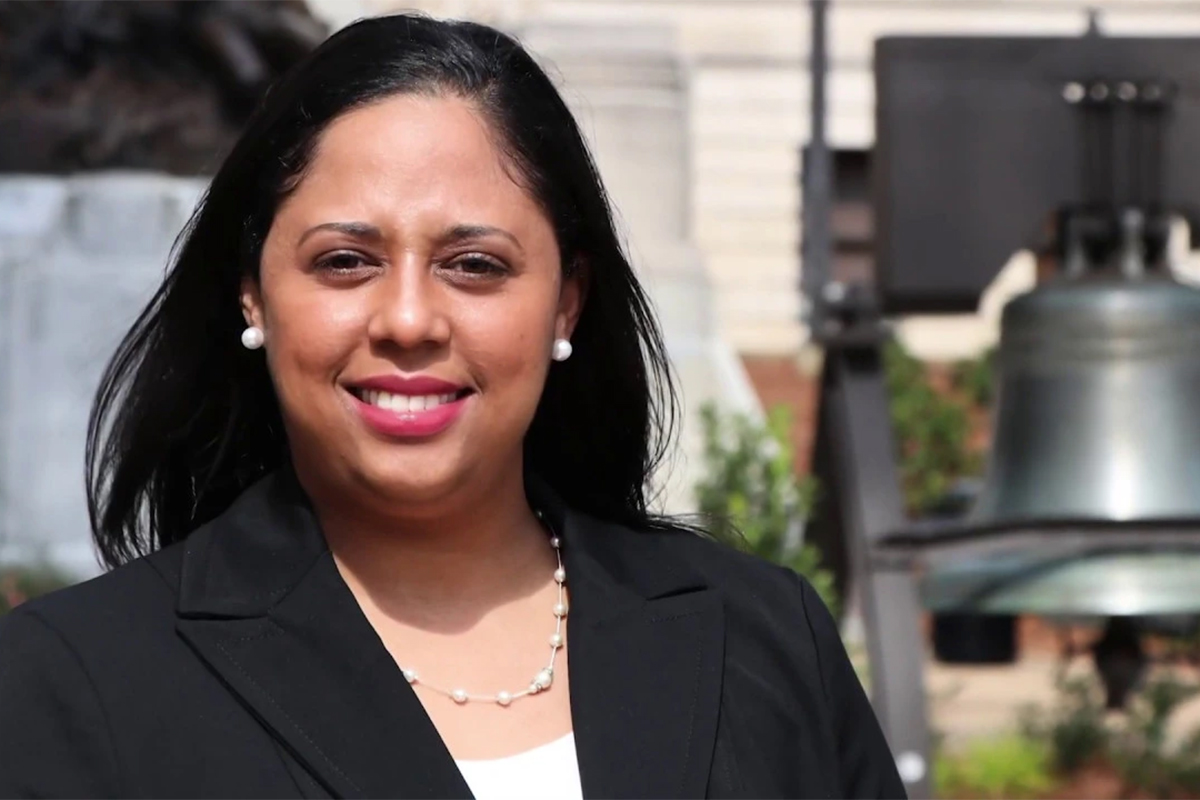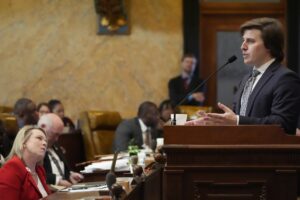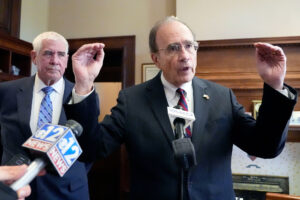Mississippi Sen. Joey Fillingane, the Republican who authored Mississippi’s trigger law that banned nearly all abortions in the state, is falsely claiming that a new effort to enshrine a right to birth control in state law will legalize “morning-after abortions.” But morning-after abortions do not exist.
On Friday, Oct. 13, members of the Mississippi Legislative Black Caucus announced plans to file a bill in next year’s legislative session called the Mississippi Right to Protection Act. In a press release, the bill’s backers said it “will protect and preserve Mississippians’ right to contraception, including condoms, the pill and IUDs.”
But in an interview on WLBT the next day, Fillingane shot down the idea.
“I think this is, again, a very cynical ploy on behalf of very woke Democrats across the country now trying to infiltrate here into Mississippi saying that our very strict law—they’re looking for exceptions, they’re looking for expansions of how to get around it, an end-run around, if you will, to allow morning after abortions,” he said.
He was referring to Plan B, also known as the morning-after pill, which can prevent pregnancies from happening if taken soon after unprotected sex, but does not terminate a pregnancy once it has begun.
“Morning-after pills do not cause an abortion. They only work if you are not already pregnant. They must be taken soon after you have sex to be effective,” the American College of Obstetricians and Gynecologists explains on its website.
Still, some anti-abortion activists and Republicans have sought to ban the pill over the years. In 2011, a majority of Mississippians voted against the Personhood Amendment, which would have defined a person to include “every human being from the moment of fertilization, cloning, or the functional equivalent thereof.” Opponents at the time warned that, by granting “personhood” to fertilized eggs before they even implanted and became pregnancies, the failed ballot initiative would have banned not only abortion but also in-vitro fertilization and forms of birth control like the morning-after pill.
The bill members of the Mississippi Legislative Black Caucus plan to introduce is modeled after a North Carolina bill called “The Right to Use Contraception Act.” The crux of the bill consists of two sentences: “The right to use contraception implicates the fundamental liberty to prevent pregnancy. It is 13 the policy of the State of North Carolina that this State has no legitimate governmental interest 14 in limiting the freedom to use contraception to prevent pregnancy.”
“Mississippians know what’s best for their health and their families,” Mississippi Legislative Black Caucus Chair Rep. Chris Bill, D-Jackson, said in the statement on Oct. 13. “Women and their partners deserve to feel confident about access to birth control–including condoms, IUDs, the pill, patches, emergency contraception, the ring–all of it. We refuse to give Republicans the opportunity to make healthcare decisions for us, and that’s why we’re announcing the intent to file a right-to-contraception act in Mississippi.”

House Rep. Zakiya Summers, the Jackson Democrat who plans to file the bill early next year, cited the State’s growing hospital crisis as she argued for the bill on Oct. 13.
“Labor and delivery units from Leflore County to Hancock County are closing. One in six women of childbearing age is uninsured, and according to a report by March of Dimes, more than half the counties in Mississippi are considered maternity health deserts,” she said. “We refuse to allow Republicans to continue to play fast and loose with Mississippi families. We have seen far too many instances of legislative action stripping our freedoms away. This time, we’re going on offense.”
Sen. Fillingane is correct in his suggestion that an out-of-state organization is involved in the effort, however. The national group Americans For Contraception Education Fund is working in Mississippi, North Carolina, Arizona, Nevada, Virginia and Wisconsin on efforts to pass bills protecting a right to contraception.
They are far from the first out-of-state group to get involved in reproductive health issues in Mississippi, however. The 2011 Personhood Amendment effort began with Personhood USA, a Colorado-based organization.
The Arizona-based anti-abortion group Alliance Defending Freedom drafted Mississippi’s 15-week abortion ban in 2018 intending to spark a U.S. Supreme Court case that could overturn federal abortion rights; their gambit succeeded when the U.S. Supreme Court upheld the law and overturned Roe v. Wade in 2022, allowing Fillingane’s even stricter trigger law to take effect.










